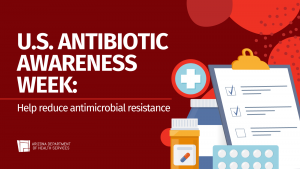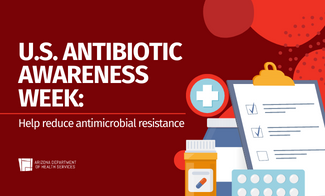 Improving our understanding of when and how to use antibiotics promotes health, fights the challenge of antimicrobial resistance, and helps ensure that antibiotics will be able to help generations to come.
Improving our understanding of when and how to use antibiotics promotes health, fights the challenge of antimicrobial resistance, and helps ensure that antibiotics will be able to help generations to come.
During U.S. Antibiotic Awareness Week, ADHS and the Centers for Disease Control and Prevention (CDC) are among organizations sharing the message that antibiotics can save lives but aren’t always the answer.
In order to Be Antibiotics Aware, remember:
- Antibiotics treat bacterial infections. As explained at azhealth.gov/AntibioticAwareness, they do not treat illnesses caused by viruses, including the common cold, COVID-19, and the flu. If a virus causes you to become ill, ask your health care provider about over-the-counter medications or the COVID-19 antiviral treatments detailed at azhealth.gov/antivirals.
- Using antibiotics inappropriately leads to antibiotic resistance, in which bacteria develop ways to survive against antibiotics. This can make infections more difficult to treat.
- When used unnecessarily, antibiotics can lead to unwanted side effects, including severe diarrhea or serious allergic reactions.
- If you are prescribed antibiotics, take them exactly as they were prescribed. Your antibiotics were prescribed to you based on your individual infection and other health factors and should never be shared with others.
Public health, health care professionals, patients, and communities need to work together to slow the development of antibiotic resistance by making sure antibiotics are used appropriately.
For more information on how to get involved with Antibiotic Awareness Week, please visit azhealth.gov/AntibioticAwareness and CDC.gov/antibiotic-use.










